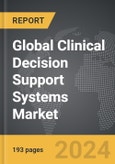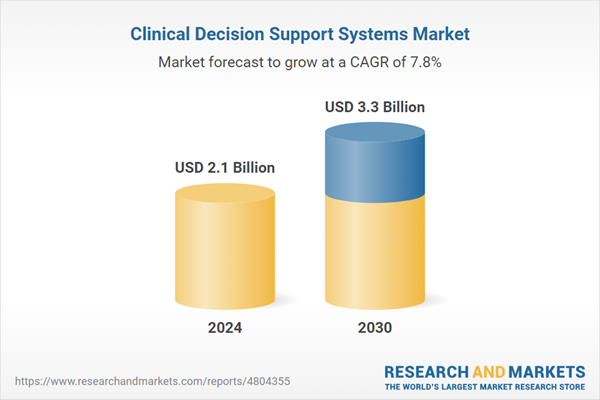Global Clinical Decision Support Systems Market - Key Trends and Drivers Summarized
How Are Clinical Decision Support Systems Revolutionizing Healthcare?
Clinical Decision Support Systems (CDSS) are transforming the healthcare landscape by empowering clinicians with advanced tools that assist in making more informed, evidence-based decisions. These systems integrate vast amounts of clinical data, medical knowledge, and patient information to provide real-time guidance during the diagnostic and treatment process. CDSS can alert doctors to potential drug interactions, suggest treatment plans based on best practices, and help prioritize patient care based on urgency. By delivering tailored recommendations at the point of care, CDSS improve diagnostic accuracy, reduce errors, and enhance patient outcomes. Moreover, these systems streamline workflow by automating routine tasks, allowing healthcare professionals to focus more on patient care. In an increasingly complex medical environment, CDSS have become essential for managing large volumes of information and ensuring that care providers stay up-to-date with the latest medical research and guidelines.How Are Technological Advancements Enhancing Clinical Decision Support Systems?
Advancements in artificial intelligence (AI), machine learning (ML), and big data are significantly enhancing the capabilities of Clinical Decision Support Systems, making them more efficient and accurate. AI and ML algorithms enable CDSS to analyze vast datasets, identify patterns, and make predictions that help in diagnosing complex conditions and optimizing treatment plans. For example, AI-driven CDSS can assess a patient's medical history, lab results, and current symptoms to predict disease progression or recommend personalized treatments. Natural language processing (NLP) has also revolutionized CDSS by enabling the system to interpret unstructured clinical data, such as physician notes and medical literature, providing more comprehensive insights. Cloud computing and improved interoperability between electronic health records (EHRs) and clinical systems have made it easier to integrate CDSS into everyday clinical workflows. These technologies allow for real-time data analysis and ensure that clinicians receive timely, evidence-based recommendations. As precision medicine becomes more prominent, CDSS are also being used to analyze genomic data, offering personalized treatment options based on a patient's genetic profile. These technological advancements are pushing the boundaries of CDSS, making them more adaptive, predictive, and integral to modern healthcare.Which Healthcare Sectors Are Benefiting Most from Clinical Decision Support Systems?
Several sectors of the healthcare industry are experiencing substantial benefits from the adoption of Clinical Decision Support Systems, particularly hospitals, outpatient clinics, and the pharmaceutical industry. Hospitals are increasingly relying on CDSS to improve patient outcomes by enhancing diagnostic accuracy and ensuring that treatment protocols are followed consistently. By integrating with EHRs, CDSS can provide real-time alerts and recommendations, helping healthcare providers avoid adverse drug interactions, misdiagnoses, or delayed treatments. In outpatient settings, CDSS support primary care physicians by offering evidence-based guidelines tailored to individual patients, improving the quality of care provided during routine visits. The pharmaceutical industry also benefits from CDSS by utilizing these systems during clinical trials and drug development. CDSS can analyze patient data to identify suitable candidates for trials, predict drug efficacy, and monitor potential side effects in real time. In addition, CDSS are widely used in managing chronic diseases, such as diabetes and hypertension, where continuous monitoring and data-driven interventions are crucial for long-term patient management. Across these sectors, CDSS are enhancing clinical efficiency, reducing healthcare costs, and improving patient care.What Are the Key Growth Drivers in the Clinical Decision Support Systems Market?
The growth in the Clinical Decision Support Systems (CDSS) market is driven by several factors, most notably the increasing adoption of electronic health records (EHRs), the push for improved healthcare quality, and the rising demand for precision medicine. As healthcare providers continue to digitize patient records, CDSS have become indispensable for analyzing EHR data and delivering personalized, evidence-based recommendations. Additionally, the shift toward value-based care, which focuses on improving patient outcomes while reducing costs, has accelerated the adoption of CDSS to ensure treatment protocols align with best practices. Precision medicine is another significant driver, as CDSS are instrumental in analyzing complex datasets, such as genetic information, to offer personalized treatment options tailored to individual patient needs. Regulatory requirements and healthcare standards, such as those aimed at reducing medication errors, have also prompted the adoption of CDSS, as these systems help healthcare organizations maintain compliance with clinical guidelines and safety protocols. Furthermore, advances in AI and machine learning have enhanced the predictive capabilities of CDSS, making them more effective in diagnosing diseases and recommending treatments. As healthcare systems strive for more data-driven, patient-centered care, the demand for sophisticated clinical decision support systems is expected to grow exponentially.Report Scope
The report analyzes the Clinical Decision Support Systems market, presented in terms of market value (USD). The analysis covers the key segments and geographic regions outlined below.- Segments: Component (Services, Hardware, Software); Product (Integrated, Standalone); Type (Therapeutic, Diagnostic); Application (Conventional, Advanced).
- Geographic Regions/Countries: World; United States; Canada; Japan; China; Europe (France; Germany; Italy; United Kingdom; and Rest of Europe); Asia-Pacific; Rest of World.
Key Insights:
- Market Growth: Understand the significant growth trajectory of the Integrated Clinical Decision Support Systems segment, which is expected to reach US$1.7 Billion by 2030 with a CAGR of 6.6%. The Standalone Clinical Decision Support Systems segment is also set to grow at 9.2% CAGR over the analysis period.
- Regional Analysis: Gain insights into the U.S. market, valued at $589.5 Million in 2024, and China, forecasted to grow at an impressive 7.5% CAGR to reach $518.6 Million by 2030. Discover growth trends in other key regions, including Japan, Canada, Germany, and the Asia-Pacific.
Why You Should Buy This Report:
- Detailed Market Analysis: Access a thorough analysis of the Global Clinical Decision Support Systems Market, covering all major geographic regions and market segments.
- Competitive Insights: Get an overview of the competitive landscape, including the market presence of major players across different geographies.
- Future Trends and Drivers: Understand the key trends and drivers shaping the future of the Global Clinical Decision Support Systems Market.
- Actionable Insights: Benefit from actionable insights that can help you identify new revenue opportunities and make strategic business decisions.
Key Questions Answered:
- How is the Global Clinical Decision Support Systems Market expected to evolve by 2030?
- What are the main drivers and restraints affecting the market?
- Which market segments will grow the most over the forecast period?
- How will market shares for different regions and segments change by 2030?
- Who are the leading players in the market, and what are their prospects?
Report Features:
- Comprehensive Market Data: Independent analysis of annual sales and market forecasts in US$ Million from 2024 to 2030.
- In-Depth Regional Analysis: Detailed insights into key markets, including the U.S., China, Japan, Canada, Europe, Asia-Pacific, Latin America, Middle East, and Africa.
- Company Profiles: Coverage of players such as Allscripts Healthcare Solutions, Inc., Cerner Corporation, Elsevier BV, Epic Systems Corporation, Hearst Health and more.
- Complimentary Updates: Receive free report updates for one year to keep you informed of the latest market developments.
Some of the 43 companies featured in this Clinical Decision Support Systems market report include:
- Allscripts Healthcare Solutions, Inc.
- Cerner Corporation
- Elsevier BV
- Epic Systems Corporation
- Hearst Health
- IBM Corporation
- McKesson Corporation
- MEDITECH
- Philips Healthcare
- Wolters Kluwer Health
This edition integrates the latest global trade and economic shifts into comprehensive market analysis. Key updates include:
- Tariff and Trade Impact: Insights into global tariff negotiations across 180+ countries, with analysis of supply chain turbulence, sourcing disruptions, and geographic realignment. Special focus on 2025 as a pivotal year for trade tensions, including updated perspectives on the Trump-era tariffs.
- Adjusted Forecasts and Analytics: Revised global and regional market forecasts through 2030, incorporating tariff effects, economic uncertainty, and structural changes in globalization. Includes historical analysis from 2015 to 2023.
- Strategic Market Dynamics: Evaluation of revised market prospects, regional outlooks, and key economic indicators such as population and urbanization trends.
- Innovation & Technology Trends: Latest developments in product and process innovation, emerging technologies, and key industry drivers shaping the competitive landscape.
- Competitive Intelligence: Updated global market share estimates for 2025, competitive positioning of major players (Strong/Active/Niche/Trivial), and refined focus on leading global brands and core players.
- Expert Insight & Commentary: Strategic analysis from economists, trade experts, and domain specialists to contextualize market shifts and identify emerging opportunities.
Table of Contents
Companies Mentioned (Partial List)
A selection of companies mentioned in this report includes, but is not limited to:
- Allscripts Healthcare Solutions, Inc.
- Cerner Corporation
- Elsevier BV
- Epic Systems Corporation
- Hearst Health
- IBM Corporation
- McKesson Corporation
- MEDITECH
- Philips Healthcare
- Wolters Kluwer Health
Table Information
| Report Attribute | Details |
|---|---|
| No. of Pages | 193 |
| Published | January 2026 |
| Forecast Period | 2024 - 2030 |
| Estimated Market Value ( USD | $ 2.1 Billion |
| Forecasted Market Value ( USD | $ 3.3 Billion |
| Compound Annual Growth Rate | 7.8% |
| Regions Covered | Global |









